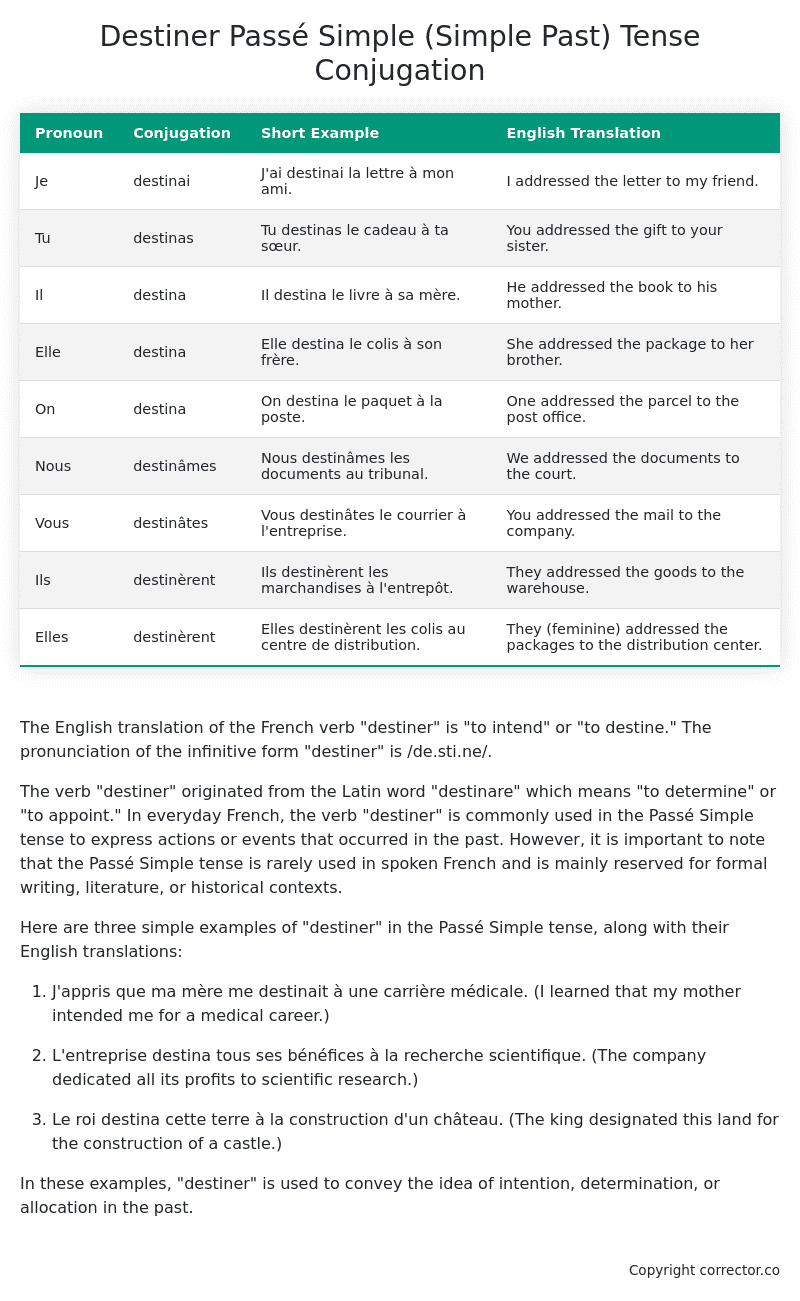Passé Simple (Simple Past) Tense Conjugation of the French Verb destiner
Introduction to the verb destiner
The English translation of the French verb “destiner” is “to intend” or “to destine.” The pronunciation of the infinitive form “destiner” is /de.sti.ne/.
The verb “destiner” originated from the Latin word “destinare” which means “to determine” or “to appoint.” In everyday French, the verb “destiner” is commonly used in the Passé Simple tense to express actions or events that occurred in the past. However, it is important to note that the Passé Simple tense is rarely used in spoken French and is mainly reserved for formal writing, literature, or historical contexts.
Here are three simple examples of “destiner” in the Passé Simple tense, along with their English translations:
-
J’appris que ma mère me destinait à une carrière médicale.
(I learned that my mother intended me for a medical career.) -
L’entreprise destina tous ses bénéfices à la recherche scientifique.
(The company dedicated all its profits to scientific research.) -
Le roi destina cette terre à la construction d’un château.
(The king designated this land for the construction of a castle.)
In these examples, “destiner” is used to convey the idea of intention, determination, or allocation in the past.
Table of the Passé Simple (Simple Past) Tense Conjugation of destiner
| Pronoun | Conjugation | Short Example | English Translation |
|---|---|---|---|
| Je | destinai | J’ai destinai la lettre à mon ami. | I addressed the letter to my friend. |
| Tu | destinas | Tu destinas le cadeau à ta sœur. | You addressed the gift to your sister. |
| Il | destina | Il destina le livre à sa mère. | He addressed the book to his mother. |
| Elle | destina | Elle destina le colis à son frère. | She addressed the package to her brother. |
| On | destina | On destina le paquet à la poste. | One addressed the parcel to the post office. |
| Nous | destinâmes | Nous destinâmes les documents au tribunal. | We addressed the documents to the court. |
| Vous | destinâtes | Vous destinâtes le courrier à l’entreprise. | You addressed the mail to the company. |
| Ils | destinèrent | Ils destinèrent les marchandises à l’entrepôt. | They addressed the goods to the warehouse. |
| Elles | destinèrent | Elles destinèrent les colis au centre de distribution. | They (feminine) addressed the packages to the distribution center. |
Other Conjugations for Destiner.
Le Present (Present Tense) Conjugation of the French Verb destiner
Imparfait (Imperfect) Tense Conjugation of the French Verb destiner
Passé Simple (Simple Past) Tense Conjugation of the French Verb destiner (You’re reading it right now!)
Passé Composé (Present Perfect) Tense Conjugation of the French Verb destiner
Futur Simple (Simple Future) Tense Conjugation of the French Verb destiner
Futur Proche (Near Future) Tense Conjugation of the French Verb destiner
Plus-que-parfait (Pluperfect) Tense Conjugation of the French Verb destiner
Passé Antérieur (Past Anterior) Tense Conjugation of the French Verb destiner
Futur Antérieur (Future Anterior) Tense Conjugation of the French Verb destiner
Subjonctif Présent (Subjunctive Present) Tense Conjugation of the French Verb destiner
Subjonctif Passé (Subjunctive Past) Tense Conjugation of the French Verb destiner
Subjonctif Imparfait (Subjunctive Imperfect) Tense Conjugation of the French Verb destiner
Subjonctif Plus-que-parfait (Subjunctive Pluperfect) Tense Conjugation of the French Verb destiner
Conditionnel Présent (Conditional Present) Tense Conjugation of the French Verb destiner
Conditionnel Passé (Conditional Past) Tense Conjugation of the French Verb destiner
Conditionnel Passé II (Conditional Past II) Tense Conjugation of the French Verb destiner
L’impératif Présent (Imperative Present) Tense Conjugation of the French Verb destiner
L’impératif Passé (Imperative Past) Tense Conjugation of the French Verb destiner
L’infinitif Présent (Infinitive Present) Tense Conjugation of the French Verb destiner
L’infinitif Passé (Infinitive Past) Tense Conjugation of the French Verb destiner
Le Participe Présent (Present Participle) Tense Conjugation of the French Verb destiner
Le Participe Passé (Past Participle) Tense Conjugation of the French Verb destiner
Struggling with French verbs or the language in general? Why not use our free French Grammar Checker – no registration required!
Get a FREE Download Study Sheet of this Conjugation 🔥
Simply right click the image below, click “save image” and get your free reference for the destiner Passé Simple tense conjugation!

Destiner – About the French Passé Simple (Simple Past) Tense
Formation
Usage
Narration
Historical Context
Interactions with other tenses
Passé Composé
Imparfait
Conditional and Subjunctive
Summary
I hope you enjoyed this article on the verb destiner. Still in a learning mood? Check out another TOTALLY random French verb conjugation!


